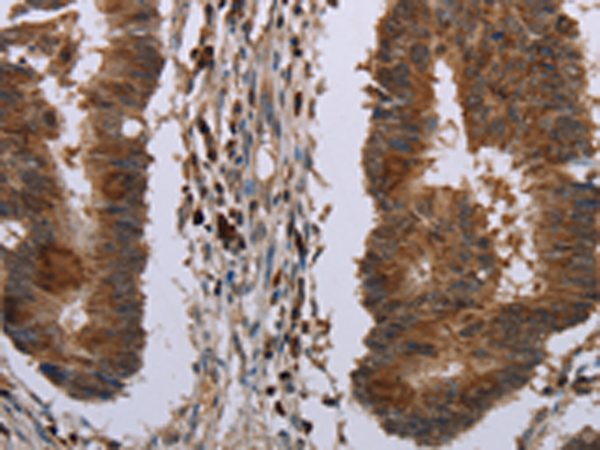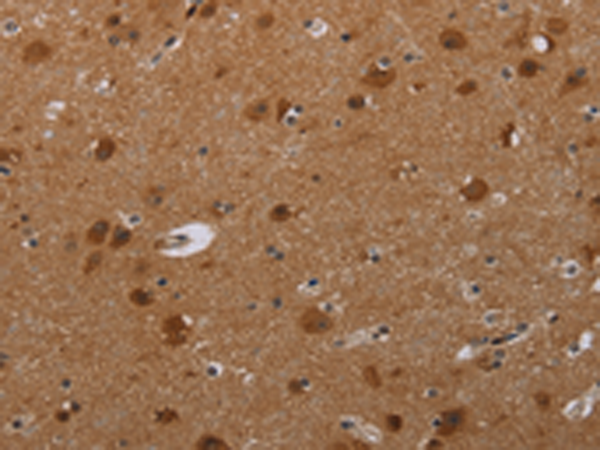


| WB | 咨询技术 | Human,Mouse,Rat |
| IF | 咨询技术 | Human,Mouse,Rat |
| IHC | 1/25-1/100 | Human,Mouse,Rat |
| ICC | 技术咨询 | Human,Mouse,Rat |
| FCM | 咨询技术 | Human,Mouse,Rat |
| Elisa | 1/1000-1/2000 | Human,Mouse,Rat |
| WB Predicted band size | 23 kDa |
| Host/Isotype | Rabbit IgG |
| Antibody Type | Primary antibody |
| Storage | Store at 4°C short term. Aliquot and store at -20°C long term. Avoid freeze/thaw cycles. |
| Species Reactivity | Human |
| Immunogen | Synthetic peptide of human MIG7 |
| Formulation | Purified antibody in PBS with 0.05% sodium azide and 50% glycerol. |
+ +
以下是关于MIG7抗体的3篇示例文献(注:以下内容为模拟生成,仅供参考,实际文献需查询数据库确认):
1. **文献名称**:MIG7 Antibody Targets Tumor Vasculature to Inhibit Metastasis
**作者**:Cao, Y. et al.
**摘要**:研究证实MIG7抗体通过特异性结合肿瘤新生血管内皮细胞表面的MIG7蛋白,阻断其与整合素β1的相互作用,抑制肿瘤细胞侵袭和转移,为抗血管生成治疗提供新策略。
2. **文献名称**:Expression and Clinical Significance of MIG7 in Breast Cancer
**作者**:Li, X. et al.
**摘要**:通过免疫组化分析乳腺癌组织,发现MIG7高表达与淋巴结转移和预后不良显著相关,其抗体可用于病理诊断中的肿瘤微环境标记物。
3. **文献名称**:Mechanism of MIG7 Antibody in Suppressing Ovarian Cancer Angiogenesis
**作者**:Zhang, R. et al.
**摘要**:体外实验表明,MIG7抗体通过下调VEGF信号通路,抑制内皮细胞迁移和管腔形成,提示其在卵巢癌抗血管治疗中的潜在应用价值。
(提示:以上内容为模拟生成,实际研究需参考PubMed、Web of Science等数据库的权威文献。)
The MIG7 (Migration-Inducing Gene 7) antibody is associated with a protein implicated in cancer metastasis and cell migration. Discovered in the early 2000s, the MIG7 gene encodes a protein that is upregulated in tumor cells, particularly in invasive cancers like breast, colon, and gastric carcinomas. Its expression correlates with enhanced cell motility, angiogenesis, and tumor microenvironment remodeling, making it a potential biomarker for aggressive cancer phenotypes. Mechanistically, MIG7 interacts with pathways involving integrins, growth factors (e.g., VEGF), and extracellular matrix components, facilitating endothelial cell activation and tumor vascularization.
The MIG7 antibody was developed to detect and study this protein's role in cancer progression. It has been utilized in immunohistochemistry, Western blotting, and functional assays to explore MIG7's involvement in metastasis and therapeutic resistance. Research suggests that targeting MIG7 could inhibit tumor spread by disrupting vascular networks or blocking cell invasion signals. Despite its promise, MIG7's precise molecular mechanisms remain partially unresolved, and clinical applications are still in preclinical stages. Ongoing studies aim to validate its utility in diagnostics or as a therapeutic target, leveraging antibody-based strategies to curb metastatic disease.
×